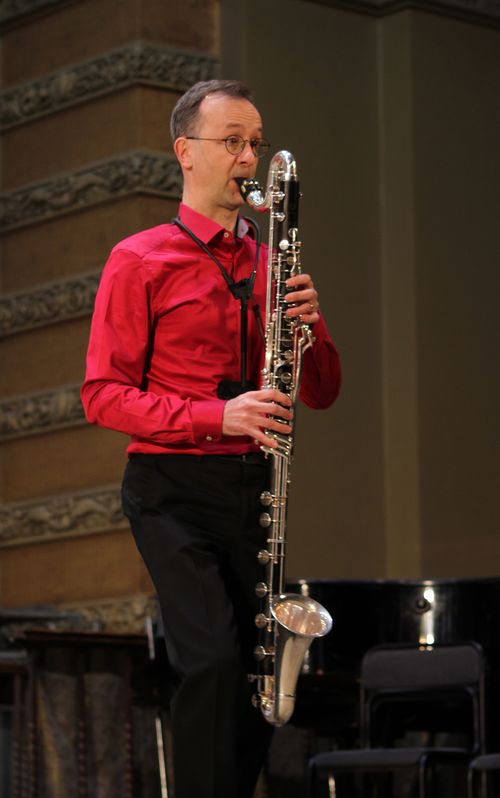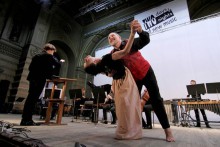However, the festival’s organizing team finds it ever harder to fight indifference of the culture department’s officials. The event’s main and almost permanent partners are the Embassies of Israel and Lithuania in Ukraine, the Polish Consulate in Odesa, the Goethe Institute in Kyiv, and the Bavarian House in Odesa.
Best contemporary music composers of Ukraine and the world presented their works there. Brilliant musicians, ensembles, and orchestras showed outstanding creative zeal in performing them. As always, the percussion ensemble of the Freiburg Conservatory, conducted by the festival’s first and only president Bernhard Wulff, offered a lively show. Finnish clarinetist Mikko Raasakka, who took part in the event for the first time, was a true revelation. His virtuoso performance with all kinds of clarinet won the hearts of the audience. (It would be unfair not to mention his pianist Antti Vahtola as well.) Frequent participant of “Two Days and Two Nights,” colorful bass-baritone from Austria Rupert Bergmann repeatedly transformed himself in two amazing programs. The first of them, called “Remembering the Shoah,” was painfully heart-rending. The second one introduced 10 one-minute mini mono-operas. Odesaite Andrii Malynych based his improvisation on works by Antoine de Saint-Exupery. Kharkivite Ehsan Tawakkul pondered the issues of war and peace, life and death. Nazar Skrypnyk from Lviv addressed the matters raised by Samuel Beckett’s theater of the absurd. Hanna Stoianova (Odesa) found her inspiration in Joseph Brodsky’s sonnets. Another Lviv-based newcomer, Mykola Khshanovsky, dreamed with Arthur Rimbaud. Kyivite Olesia Halas was inspired by Blaise Pascal. Three more composers – Oleksandr Kostov from Odesa, his fellow Odesaite Hanna Kopiika and Kyivite Anton Stuk – improvised and joked about natural and supernatural phenomena. Rupert Bergmann, enraptured with a variety of music and themes, allowed free reign to his artistry, while ensemble SENZA SFORZANDO, conducted by Oleksandr Perepelytsia Jr., not only offered an inspired accompaniment, but also sang along and danced.
Incidentally, this totally unusual act would have never been presented to the public, if not for this festival. There, it was instantly noticed, and the performers have already received invitations to visit other countries.
The festival is a time of heightened emotions, but it also got its three legendary figures thinking deeply.

THE FIRST PERFORMANCE OF THE EXCELLENT MUSICIAN MIKKO RAASAKKA (FINLAND) AT THE FEST
Bernhard WULFF:
“Of course, Ukraine is still in a very difficult political and economic situation. But culture is the heart of the country. Culture is more than piano or cello performances. Culture is a measure of the given society’s unity. And if we want to survive in this world, we need art and imagination as much as we need air to breathe. After all, it is art that keeps imagination alive in our world. Ukraine needs this support now more than ever, in art and other branches of culture. The government should understand that art is not just an ornament of everyday life, but a basic necessity, like food and water. The importance of this festival is priceless. It is important to keep it going, because it holds the promise of the future. I think that many people have stopped believing in the future. But the future is ahead of us, not behind. The younger generation must be prepared to meet it. The future cannot be planned. It grows like a tree. But this tree can be helped as it grows. So, this festival is very important, not only for your country. I would like to see the government and individuals responsible for the fate of the country to focus not only on solving pressing problems of today, but be mindful of the future as well. Such events create a platform for culture. The festival in Odesa provides one with a broad understanding of contemporary art. It is not like the others, because it is not clinging to someone’s personal aesthetics, but offers a broader-based interpretation of art.”
Mikko RAASAKKA:
“It was a very interesting and unusual experience for me. Surprisingly, Ukraine, despite being in a very difficult situation, was able to organize such a major festival of contemporary music. Its participants belonged to different age groups, different schools, and the list of their hometowns is endless. I am very pleased of having been able to come here.
“I did not listened to it all, but two concerts were truly striking, I mean ‘Remembering the Shoah’ and 10 mono mini-operas. Unfortunately, we spend almost all the time to rehearse our own performances, and thus there is no time left to listen to other concerts.
“We have festivals of contemporary music in Finland, too. But they are all different from each other and from the Odesa festival as well. For example, one of the oldest festivals is held in the middle of Finland, in a place surrounded by lakes and forests. Many famous artists come there. But still, it differs from the festival in Odesa. The latter is powerful and original.
“I believe the works of contemporary Ukrainian composers to be very interesting. I was pleased to perform some of their works. We have a lot of fine composers in Finland, but their works are more academic. Meanwhile, the Ukrainians’ works are full of imagination and expression.”
Rupert BERGMANN:
“When I was in Odesa in 2014, we discussed plans for the next festival. Unfortunately, I was very busy and could not come to Odesa in 2015. I decided to ask young Ukrainian composers to create a music piece, with each choosing something close to their heart. Karmella Tsepkolenko, creative as she is, liked the idea, and she spread it among debutant composers all over Ukraine. I got a huge inspiration in the process. All in all, this festival is one of the most interesting in Europe. It is well known both in Ukraine and abroad. Long live those who make and support it!”








